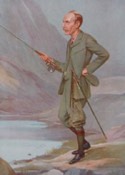Clement-Jones family - Person Sheet
Clement-Jones family - Person Sheet
Birth1853
Death1934
EducationClifton and Trinity College, Cambridge
FatherCharles BUXTON , 1869 (1822-1871)
MotherEmily Mary HOLLAND , 1868 (1824-1908)
Spouses
1Constance Mary LUBBOCK, 1911
Birth1859
Death1892
FatherJohn LUBBOCK 4th Bt and 1st Baron Avebury , 5601 (1834-1913)
MotherEllen Frances HORDEN , 9982 (1841-1879)
Notes for Sir Sydney Charles BUXTON., 1ST EARL BUXTON
From WIkipedia
Sydney Charles Buxton, 1st Earl Buxton, GCMG, PC (25 October 1853 – 15 October 1934) was a British Liberal politician of the late 19th and early 20th centuries.
Buxton was the son of Charles Buxton and the grandson of social reformer Sir Thomas Fowell Buxton, 1st Baronet. His mother was Emily Mary, daughter of the physician and traveller Sir Henry Holland, 1st Baronet. He was born in London and educated at Clifton and Trinity College, Cambridge, and was a member of the London School Board from 1876 to 1882. In 1880, he became prominent in political circles by the publication of his Handbook to the Political Questions of the Day, a work which eventually went through 11 editions. That same year, he ran for Parliament in the constituency of Boston, but lost. However, he was able to become an MP in 1883 by means of winning a by-election in Peterborough. He went down in defeat during the 1885 general election, but returned to Parliament the very next year, representing the constituency of Poplar. He would represent this constituency in Parliament until 1914.
From 1892 to 1895, Buxton served as Under-Secretary of State for the Colonies. In 1905, he earned his first Cabinet post, that of Postmaster-General. In this capacity he introduced such services as penny postage to the United States, the Canadian magazine post, and cheap postage for the blind. In 1910, Buxton was named President of the Board of Trade; in this position he oversaw the passage or amendment of many trade and commerce laws. Upon the sinking of the RMS Titanic in 1912, he asked Lord Loreburn, the Lord Chancellor, to appoint a commission of inquiry into the disaster. This commission eventually came to be headed by Lord Mersey.
In February 1914, Buxton was appointed Governor-General of South Africa, and in May of that year he was raised to the peerage as Viscount Buxton, of Newtimber in the County of Sussex. A revolt by the South African populace on the outbreak of the First World War temporarily threatened his safety, but the country's Prime Minister, General Louis Botha, immediately attached South Africa to Britain's side. Thereafter, Buxton and Botha formed an effective partnership, planning and executing South African actions in the war, including the invasion of the neighbouring German colony of South West Africa. Buxton travelled widely throughout South Africa, and endeared himself to the people. Upon his retirement in 1920, the people demonstrated their affection for him. He continued his interest in South African affairs even after returning to England, serving as president of the Africa Society from 1920 to 1933.
He was created Earl Buxton in 1920, and continued to be a member of the Liberal Party, often supporting his close friend and colleague Sir Edward Grey. In his later years, he had to undergo amputation of his leg due to a knee injury sustained earlier in his life. He died at Newtimber on October 15, 1934.


